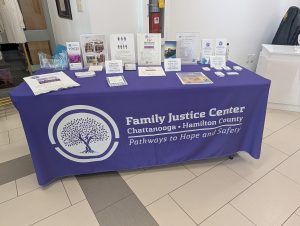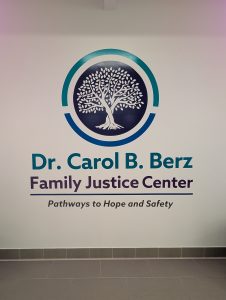

JARRETT GOODMAN
Staff Writer
Chattanooga’s Family Justice Center (FJC) has recently held its 10th Annual Domestic Violence Awareness Conference on Friday, Oct. 24.
The conference, held every October as part of Domestic Violence Awareness Month, was an all-day event promoting the program’s services that aim to help prevent domestic violence within the community. Sonya Reaves, FJC Education Coordinator, explained this year’s event aimed to promote the program to business owners and entrepreneurs. The event also aimed to educate how domestic violence has a negative effect on a work environment, and how businesses can play a role supporting victims through a safe and friendly environment.
FJC is a non-profit branch of Alliance for Hope International, a global institution dedicated to helping victims and families affected by domestic abuse and sexual assault. Alliance for Hope houses different justice centers across the nation, including Chattanooga’s office located northeast of East Ridge. The facility opened in 2015 and serves as the city’s main facility for domestic abuse prevention. The program is an official department under the city of Chattanooga, working to bring together local businesses and other non-profits similarly aiming to help those in need throughout the community.
“We all work together, we’re a big community supporting each other and offering services to the survivors,” said Reaves.
Tennessee’s rate of domestic violence towards women is 13% higher than the national average, and violence against men is 6.5% higher. The state is also ranked among ten states having the highest rate of women killed by men due to domestic violence.
Executive Director Regina McDevitt explained because of the state having 14 justice centers, more reports of domestic violence are made and taken record of each year. Additionally, cases of domestic violence go unnoticed due to lack of reporting, particuarlily out of fear of the victim sharing their story to local authorities. Rural communities including those in Marion County also don’t share the same number of resources for domestic violence prevention and recovery, adding on to more cases of abuse going unnoticed.
“When there are fewer resources in a rural community, it lends itself to be less safe for someone to report,” explained McDevitt.
In its history, 15% of victims seeking help through FJC live outside of Hamilton County. Despite the program being a Chattanooga-based department, its open door policy allows victims from other counties and states to visit and seek help through the program. FJC in Chattanooga has also looked towards other communities surrounding outside county lines to potentially establish regional facilities, and hire staff to represent different counties. This initiative, once receiving proper funding, could significantly open the doors for FJC to expand its services to neighboring communities, including Marion County.

